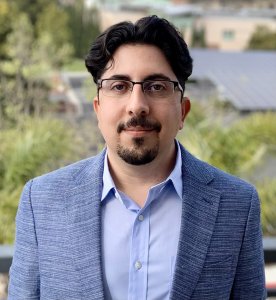Presented By: Center for RNA Biomedicine
RNA Seminar featuring: Thomas Martinez, Salk Institute for Biological Studies
"Annotation and Characterization of Human Protein-coding Small Open Reading Frames"

Registration Required: https://umich.zoom.us/webinar/register/WN_90RkcQTGQZa7ifQ8kbSdNQ
KEYOWORDS: microprotein, smORF, ribosome profiling
ABSTRACT: Functional protein-coding small open reading frames (smORFs) are emerging as an important class of genes. Several smORF-encoded microproteins have been characterized and implicated in a variety of critical processes, including regulation of mRNA decay, DNA repair, and muscle formation. Thus, rigorous and comprehensive annotation of protein-coding smORFs is critical to our understanding of basic biology and physiology, as well as disease. We recently developed an improved workflow that integrates de novo transcriptome assembly and ribosome profiling to overcome obstacles with previous methods to more confidently annotate thousands of novel smORFs across multiple human cell lines, including hundreds encoded on putative non-coding RNAs. Over 1,500 smORFs are found in two or more cell lines, and ~40% lack a canonical AUG start codon. Evolutionary conservation analyses suggest that hundreds of smORF-encoded microproteins are likely functional. We also find that smORF-derived peptides are detectable on human leukocyte antigen complexes, positioning smORFs as a source of novel antigens. The annotation of protein-coding smORFs radically alters the current view of the human genome’s coding capacity and will provide a rich pool of unexplored, functional human genes.
BIO: Thomas received his B.S. in Biological Engineering from MIT and trained in Prof. JoAnne Stubbe’s laboratory, where he studied the mechanism of ribonucleotide reductase. He then recieved his Ph.D. in Biochemistry & Molecular Biophysics from Caltech as an NIH NRSA predoctoral fellow under the mentorship of Prof. Peter Dervan. His thesis work focused primarily on characterizing the effects of DNA binding pyrrole-imidazole polyamides on DNA replication in prostate cancer cells. Thomas is currently an NIH NRSA postdoctoral fellow in Prof. Alan Saghatelian’s laboratory, where he has developed an integrative platform combining ribosome profiling and de novo transcriptome assembly to discover functional smORF encoded microproteins in the human genome.
KEYOWORDS: microprotein, smORF, ribosome profiling
ABSTRACT: Functional protein-coding small open reading frames (smORFs) are emerging as an important class of genes. Several smORF-encoded microproteins have been characterized and implicated in a variety of critical processes, including regulation of mRNA decay, DNA repair, and muscle formation. Thus, rigorous and comprehensive annotation of protein-coding smORFs is critical to our understanding of basic biology and physiology, as well as disease. We recently developed an improved workflow that integrates de novo transcriptome assembly and ribosome profiling to overcome obstacles with previous methods to more confidently annotate thousands of novel smORFs across multiple human cell lines, including hundreds encoded on putative non-coding RNAs. Over 1,500 smORFs are found in two or more cell lines, and ~40% lack a canonical AUG start codon. Evolutionary conservation analyses suggest that hundreds of smORF-encoded microproteins are likely functional. We also find that smORF-derived peptides are detectable on human leukocyte antigen complexes, positioning smORFs as a source of novel antigens. The annotation of protein-coding smORFs radically alters the current view of the human genome’s coding capacity and will provide a rich pool of unexplored, functional human genes.
BIO: Thomas received his B.S. in Biological Engineering from MIT and trained in Prof. JoAnne Stubbe’s laboratory, where he studied the mechanism of ribonucleotide reductase. He then recieved his Ph.D. in Biochemistry & Molecular Biophysics from Caltech as an NIH NRSA predoctoral fellow under the mentorship of Prof. Peter Dervan. His thesis work focused primarily on characterizing the effects of DNA binding pyrrole-imidazole polyamides on DNA replication in prostate cancer cells. Thomas is currently an NIH NRSA postdoctoral fellow in Prof. Alan Saghatelian’s laboratory, where he has developed an integrative platform combining ribosome profiling and de novo transcriptome assembly to discover functional smORF encoded microproteins in the human genome.